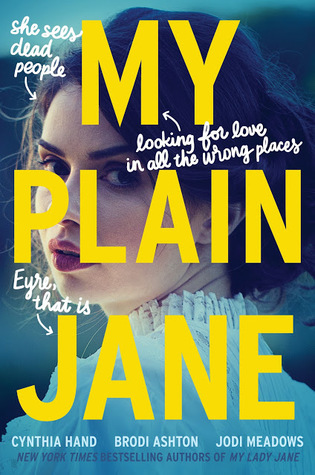More on this book
Community
Kindle Notes & Highlights
If there was something strange in your neighborhood, you could, um, write the Society a letter, and they would promptly send an agent to take care of it.
Charlotte had always known Jane to be a kind, thoughtful sort of person. Even when she was committing murder, she was thinking of others.
People never called him because of friendly ghosts.
Helen shook her head. “I think it might be haunted by the living.”
Charlotte swallowed down a lump of disappointment in her throat, both because she was a wretched female and because she had never died, not even once. It all felt so wildly unfair.
Charlotte’s chin lifted. “I would always rather be happy than dignified,” she said, her cheerful tone returning, and out she went.
“Charlotte is my sister, Mr. Blackwood.” Alexander’s mouth dropped open. “But how?” “Well, sir, when two consenting adults—” “Stop!”
“You’re definitely not coming with us,” Alexander said. “Not a chance.” Reader, Miss Brontë definitely went with them.
“Go home, Miss Brontë.” “I can’t afford any more delays, Miss Brontë.” “Please stop talking, Miss Brontë.” Nevertheless, she persisted.
“Earlier this year, His Majesty decided to balance the royal budget.” “He kept Meals on Wheels and the National Endowment for the Arts,” Branwell said, “because we aren’t animals, for pity’s sake. But the Society . . .” “The Society had to go,”
Love trumped everything in a woman’s life. More than ambition. Respectability. Common sense. Love, they’d both been taught, conquers all.
“Never in any Jane Austen novel did the love interest pretend to be a fortune-teller,” Helen said. “Why would someone do that?
Yes, for the umpteenth time, someone is hiding behind a panel. Apparently in pre-Victorian England, there were panels everywhere, and people hid behind them. Frequently. From what we could discover during our thorough research of the subject, panels were advertised by how well someone might hide behind one.
As a general rule, Alexander found everything suspicious. Like, why didn’t women’s clothes have pockets?
At first glance, they found . . . everything in perfect order. No strange memory-altering artifacts. No device that removed the ability to speak French.
And it’s not really a failure. It’s a temporary setback.” She scribbled something in her notebook and muttered, “Temporary setback.” Then she looked up at him again. “Attitude is everything. We can’t call it a failure, because it’s not.”
Words were good. But sometimes they were simply inadequate.
He smiled and her heart went boom.
He was everything she’d ever dreamed about. Tall. Dark. Brooding. But he also had a penchant for lying, and making Jane think she was crazy, and not telling her the full story.
“Can I offer you some tea?” he asked in a voice that portrayed that he was only offering because this was England and it was the polite thing to do,
Jane closed her eyes. She knew that feeling. She knew Charlotte knew that feeling as well. Helen’s head burst into flames. Helen had a point.
“Faster!” Mr. Blackwood said. “We’re going as fast as we can,” Charlotte said back. “Have you seen the shoes we’re expected to wear?”
It wasn’t as though people like Rochester kept pistols mounted to their walls. (Meanwhile, in America . . .) A
“My name is Alexander Blackwood. You killed my father. Prepare to—” “Who was your father?”
And I would have gotten away with it, too, if it hadn’t been for—”
“Of course I’ve been lying. I’m a politician.”
It was impossible to tell, under these circumstances, if Mr. Rochester was alive or dead or possibly a pirate.
Charlotte thought this was a marvelous twist in her story. And also, of course, terrible news.
“He keeps it locked in a room guarded by a three-headed dog, which drops into a pit of strangling vines, followed by a life-or-death life-size game of chess, which opens into a room with a locked door and a hundred keys on wings, and then there’s a mirror. . . .” Branwell gasped. “That’s horrible! That poor three-headed dog!”
“Now,” she said, “we storm the castle.” “I thought it was a palace.” Miss Burns grinned. “Whatever.” Miss Brontë lifted her spectacles. “Let’s storm it.”
(although we would argue, dear reader, that all books are slightly magical),
A radiant girl with red hair caught Charlotte’s eye. She was dressed in a gorgeous embroidered, jewel-encrusted gown and an Elizabethan headdress. In her hand she held a book. She smiled sweetly at Jane, and reached for the man beside her, who, to Charlotte’s total astonishment, suddenly turned into a horse.
A shudder made its way down Charlotte’s spine. There was nothing so disturbing to her as an overdue book. Possible fines. It was very scary.
“It’s a girl. Victoria, I think her name is.” The duke chuckled. “As if a woman could ever rule a country without a man behind her secretly pulling the strings.” Charlotte’s mouth opened. “That doesn’t make sense. Elizabeth was a great queen!”
I always knew my life was for books.”
Death could not stop true love, whether that love was paternal or platonic or romantic. Love extended across worlds.
Alexander . . . Bell. It feels there’s an obvious middle to that.”
She sighed. “The truth was ever so much more exciting.” “But who’d believe it?” Jane argued. “Ghosts and possessions and people who trap the wayward spirits of the dead? What a tall tale, indeed. Besides, we’ve all agreed that the Society should be a secret. Now that Mr. Blackwood is running things. No, it’s my story, in a way, my name anyway, and I want it to be a love story.”


